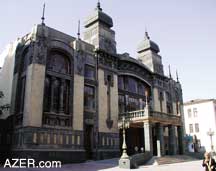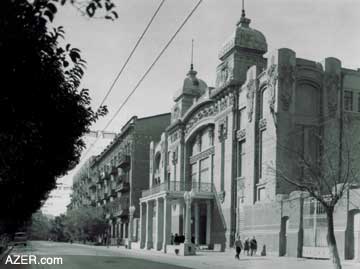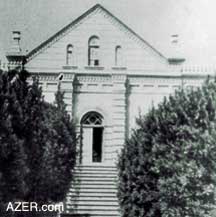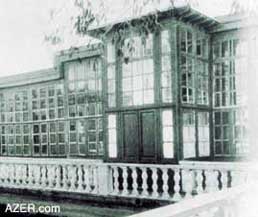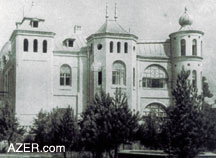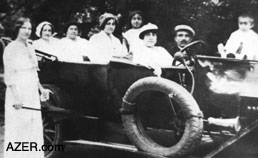|
The opera house was designed by Architect N.G. Baev and built by the Oil Baron Mailov Brothers in 1910-1911.
Above: Oil Baron SummerHomes in Mardakan: contraclockwise: Asadullayev's, Mukhtarov's and Hajinski's. Bottom right: One of the first cars in Baku, here being driven by Naghiyev's wife. "And then: I think it would be a very good thing if we made a big fire and burnt all those oil derricks. It would look lovely, and we'd all be poor again. And instead of the oil derricks, I'd build a beautiful mosque with blue tiles. We should get buffaloes, and plant corn on the oil land." He fell silent, dreaming of this vision. Ilyas Bey laughed happily [Note: "bey" is a title of address used with male personal names to show deference to wealth or land ownership. It was used during the Pre-revolutionary and has again become popular use since the collapse of the Soviet Union. During Soviet times, "muallim" (teacher) was the politically correct term to use] "And then all reading and writing should be forbidden, we'd use candles instead of electricity, and elect the most stupid man king of the country." Mahmad Heydar did not realize that he was getting his leg pulled: "That's all right," he said, "in the olden times there were many more stupid people about. And they built canals instead of oil derricks, and robbed the foreigners, instead of letting them rob us. In those times people were happier than they are now." I felt like embracing and kissing the simple fellow. He spoke as if he himself were a chunk of our poor tortured earth. "But suddenly a wild knocking at the door made me jump. I looked out. Sayid Mustafa rushed into the room. His turban hung to one side over his glistening brow. His green belt had come loose, his gray cap was dusty. He fell on a chair and gasped: "Nachararyan has kidnapped Nino. Half and hour ago. They're on the road to Mardakan!" [a wealthy suburb on the Absheron Peninsula where many of the Oil Barons had summer homes]. Mahmad Heydar sprang to his feet. His eyes had become quite small. "I'll saddle the horses." He rushed out. The blood was pounding in my head, there was a drumming sound in my ears, and I felt an invisible hand beating my head with a stick. "[Then Seyid Mustafa continued his story] The sinful play had just ended. I saw Nino get into the car, Nachararyan with her. But the car did not start. They were talking. I did not like the look on Nachararyan's face. I crept nearer. I listened. "No," said Nino, "I love him." "I love you more," said Nachararyan, "no stone in this country will be left standing. I will save you from the claws of Asia." "No," said Nino, "take me home." He started the motor. I jumped on the back [said Heydar]. The car went to the Kipiani's house. I could not hear what they were saying, but they were talking all the time. The car stopped at t he house. Nino was crying. Suddenly Nachararyan embraced her and kissed her face. "You must not fall into the hands of these savages," he cried and then he whispered something and I could only hear the end: "to my place at Mardakan, we'll get married in Moscow and then we'll go to Sweden." "I saw Nino pushing him away. Then the motor started again, and I jumped off and ran as fast as I could to" He did not finish the sentence, or maybe I just didn't hear the end. Mahmad Heydar came tearing through the door, and cried: "The horses are ready." We ran into the yard. The moon shone on the horses, standing there, stamping and neighing softly. "Here," said Mahmad Heydar. I looked at the horse and was struck numb. There stood the red golden miracle of Karabakh, the horse of Malikov, the regiment's Commanding Officer- one of the 12 golden horses in the whole world. Mahmad Heydar's face was dark. The Commander will go mad. No one but him has ever rode this horse. It runs like the wind. Don't spare it. You'll catch them." "I whip the horse. A wild cry. So howls the desert wolf when he sees the moon, with a long drawn, high mournful wail. All the night is just that one sound. I lean still further forward. My throat hurts. Why am I crying on the moonlit path to Mardakan? I must save my fury. A sharp wind whips my face. That is what makes my tears fall, nothing else. I do not cry, not even when I suddenly know that there is no bride between East and West, not even the bridge of love. "My teeth sink deeply into the horse's flesh. How marvelous that we're in Asia, in wild, reactionary Asia! We have no smooth road for Western cars here, just rough paths for Karabakh horses. How quickly can a car go on these roads, and how swiftly races a horse from Karabakh? Will the horse survive this ride? I don't think so. I can still see Malikov's face on that day in Shusha when his sabre was rattling and he was saying: "Only when the Czar calls to war I mount this horse." Hell! Let him weep for his horse, the old man from Karabakh. Again my whip swishes through the air, and again. The wind beats on my face as if with fists. A turning-wild bushes at the roadside-and at last-far away I can hear the rattling of the motor. Now two glaring lamps shed a white stream of light on the bumpy road. The car! Slowly drags itself forward. A European car, helpless on Asia's roads. Now I can recognize Nacharayan at the steering wheel... "He feels so secure in his European car, going to Mardakan. Let it stop, this lacquered box! Now this minute! I slip the safety catch off my revolver. Come on, dear little Belgian tool, do your duty. I fire. For a second a narrow strip of flame blazes along the road. I stop the horse. Well done, little Belgian friend. The left tire goes down like a suddenly deflated toy balloon. The lacquered box stops. I ride up to it, blood pounding in my temples. I throw my weapon away. I don't really know any more what I am doing. Two faces look at me, eyes staring in wild terror. "Steady now, I draw my dagger. The trembling hand is not going to shoot. With a melodious whistle, the dagger swishes through the air. Where did I learn to throw a dagger? In Persia? In Shusha? Nowhere! It is in my blood, in my veins, inherited from my wild ancestors, this knowledge of the exact arc the dagger must describe. Inherited from the first Shirvanshir, who went to India and conquered Delhi. A cry, surprising high and thin."
|

